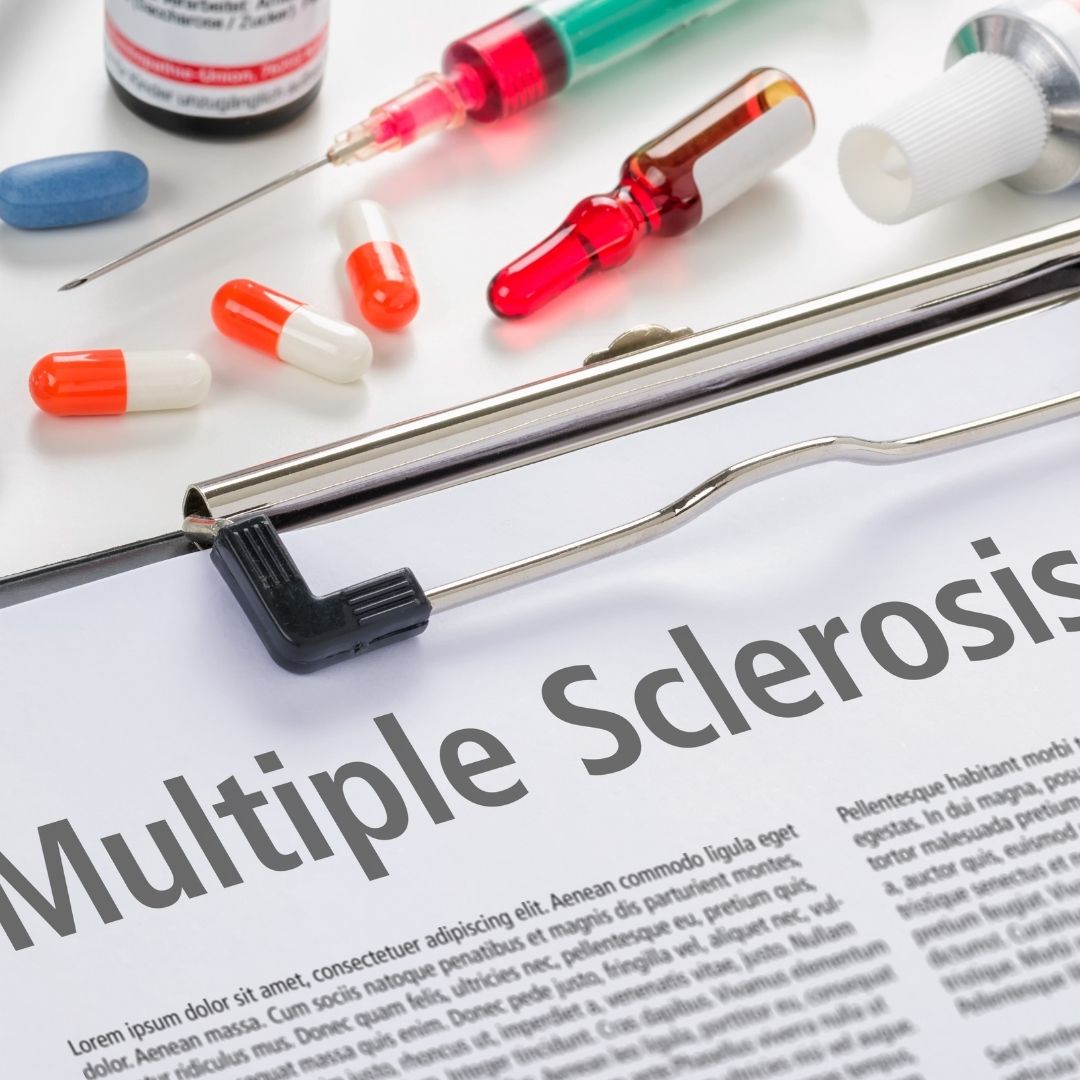An autoimmune disease is a condition where the immune system starts attacking its own body’s cells. This detrimental effect can lead to various complications and other diseases. The immune system cannot differentiate between foreign cells and its own cells, which leads to this condition. They can either target one organ, in Type 1 diabetes, or target multiple organs, in systemic lupus erythematosus.
What is Multiple Sclerosis?
Multiple Sclerosis, also known as encephalomyelitis disseminate, is an autoimmune disease that attacks the myelin sheath of the nerve cells in the brain and spine. The myelin sheath is an insulating layer of proteins and fats that protects the axon of the nerve cells. This sheath allows proper electrical impulses to take place quickly and efficiently. It is made by two cells, oligodendrocytes, and Schwann cells.
During multiple sclerosis, the immune system starts eating away at the myelin sheath. It disrupts the electrical signals to pass effectively from cell-to-cell and causes a range of symptoms, from muscle weakness to paralysis in the legs. It can lead to permanent damage or deterioration of nerve cells. When a nerve fiber is exposed, the impulses can be slower or can stop completely.
Statistics
6.4% of women and 2.7% of men are likely to develop some kind of an autoimmune disease at some point in their lifetime. More than 2.3 million people in the world have multiple sclerosis. In India, almost every 5-10 per 1,00,000 individuals have multiple sclerosis. A study in 2015 stated that the number of people diagnosed with multiple sclerosis per year had almost doubled.
Causes Multiple Sclerosis
Since it is an autoimmune disease, the exact cause of multiple sclerosis is unknown. However, a couple of factors can increase the risk of this disease.
- Age: multiple sclerosis is one of the most common disabilities in younger adults. It can develop at any age but is usually seen in adults from the age of 20-40.
- Sex: Women have a double or triple higher chance of developing multiple sclerosis than men. This could be due to the role of female hormones.
- Inheritance: multiple sclerosis is not hereditary but it can get passed down generations. The risk of siblings or children developing multiple sclerosis is higher.
- Infections: a research article conducted in 2014 states that multiple sclerosis can be linked with microbial infections like Chlamydia pneumonia and staphylococcus aureus produced enterotoxins.
- Race: Caucasian people, usually of European descent, have the greatest risk of developing multiple sclerosis, whereas people of Asian or African descent, have the least risk.
- Vitamin D: People with lower levels of vitamin D have a higher risk of developing multiple sclerosis.
- Climate: climate does not cause this disease but it can worsen the symptoms of multiple sclerosis. This is usually temporary.
Symptoms of Multiple Sclerosis
The symptoms of multiple sclerosis are unpredictable and can vary from person to person. Some symptoms of multiple sclerosis include:
- Muscle stiffness, pain and spasms of the extremities.
- Tingling and numbness in various parts of the body.
- Vision problems like double vision, blurred vision and sometimes even loss of vision.
- Fatigue and weakness due to nerve deterioration in the spinal cord.
- Dizziness and incoordination in balance, often similar to vertigo.
- Bladder, bowel and sexual dysfunction where patients lose bladder and bowel control.
- Cognitive issues like disorientation, shortened attention span and loss in memory.
- Emotional health is affected leading to irritability and mood swings.
Diagnosis:
There is no specific test to diagnose multiple sclerosis. However, various other tests can rule out different diseases with similar symptoms to arrive at a conclusion. They are:
- Blood test: A blood test can check for specific biomarkers that may be associated with multiple sclerosis.
- Spinal tap: A puncture in the lumbar region of the spine can sample the cerebrospinal fluid for any abnormalities in antibodies.
- Magnetic resonance imaging: An MRI can detect lesions on the brain and spinal cord which could be an underlying cause of multiple sclerosis.
- Evoked potential test: An evoked potential test measures the speed of nerve messages along sensory nerves to the brain and a visual or electrical stimuli test used in the diagnosis of multiple sclerosis.
Treatment:

There is no cure for Multiple sclerosis. Treatment is focused on 3 main concerns:
- Treatment for attacks
Corticosteroids: they decrease inflammation but have various side effects like fluid retention, mood swings, and an increase in blood pressure and blood glucose levels.
Plasma exchange: exchanging plasma in the blood for albumin is used when the patient doesn’t respond to steroids
- Treatment to slow the progression
Treatment in the early stages can lower the relapse rate, slow the formation of new lesions, and reduce the risk of brain atrophy. For primary-progressive MS, ocrelizumab (Ocrevus) is the only FDA-approved disease-modifying therapy. There are various options available for relapses of MS such as Injectables (Interferon beta medication, Glatiamer acetate), oral medication (Dimethyl fumarate, Teriflunomide), or infusion treatments (Natalizumab).
- Treatment for symptoms
Physiotherapy: Stretching and strengthening exercises can reduce muscle weakness and improve gait problems.
Muscle relaxants: Relieves muscle stiffness and spasms.
Medications to reduce fatigue and improve mood: Selective serotonin reuptake inhibitors can be used for depression and Amantadine can decrease fatigue.
Conclusion:
Living with any chronic illness is not an easy task. The key to combating the ill effects of multiple sclerosis is early detection, right treatment, and therapy. It is important that one continues to move on with their daily tasks as much as possible. Having a positive outlook on life can really help make multiple sclerosis not as intimidating as it is.
Do check our recent blog – https://www.saideephospital.com/2020/11/17/the-most-common-dental-problem-pyria/
Stay tuned for regular health update – https://www.instagram.com/saideephealthcareofficial/



After my Multiple Sclerosis diagnosis, my primary care provider introduced me to RichHerbs Foundation and their MS Formula protocol, the herbal treatment has made a big difference for me. My symptoms including numbness and muscle weakness all disappeared after the treatment plan! Their page is w w w. richherbsfoundation. c o m.
MUST READ
I was diagnosed with multiple sclerosis 1 month after I turned 50. My grandma is 96 and had it since she was in her 20s. I have been on WORLDHERBSCLINIC MS HERBAL FORMULA, the first TWO MONTHS was daily and now I am on 3 times a week. It has made a tremendous difference for me. The fatigue never gets to me again. When I do too much, I don’t feel weak anymore..
Very nice informative and impressive post you have written, this is quite interesting and i have went through it completely, an upgraded information is shared, keep sharing such valuable information.you can also checkBest Rheumatologist in Nizamabad
The blog was absolutely fantastic! Lots of excellent information that can be useful in one way or another. Keep updating the blog, waiting for more content … Good job, keep it up. Best doctor for joint pains in Hyderabad